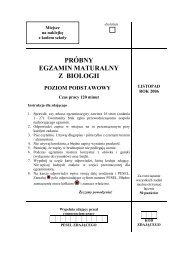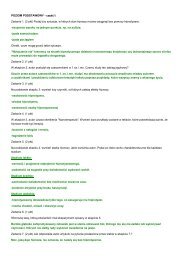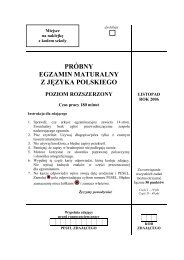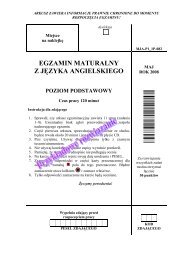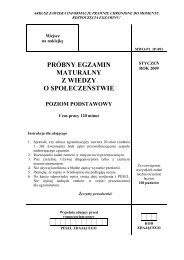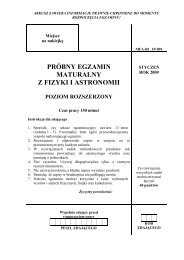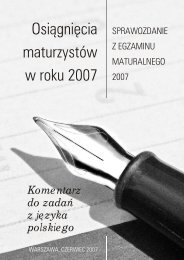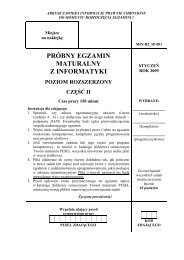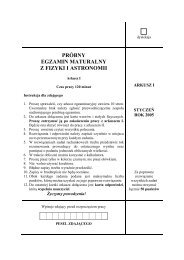Matura 2008 - dlaStudenta.pl
Matura 2008 - dlaStudenta.pl
Matura 2008 - dlaStudenta.pl
Create successful ePaper yourself
Turn your PDF publications into a flip-book with our unique Google optimized e-Paper software.
ARKUSZ ZAWIERA INFORMACJE PRAWNIE CHRONIONE DO MOMENTU<br />
ROZPOCZĘCIA EGZAMINU!<br />
Miejsce<br />
na naklejkę<br />
dysleksja<br />
MJA-R2_1P-082<br />
EGZAMIN MATURALNY<br />
Z JĘZYKA ANGIELSKIEGO<br />
MAJ<br />
ROK <strong>2008</strong><br />
POZIOM ROZSZERZONY<br />
CZĘŚĆ II<br />
Czas pracy 70 minut<br />
Instrukcja dla zdającego<br />
1. Sprawdź, czy arkusz egzaminacyjny zawiera 7 stron<br />
(zadania 4 – 9). Ewentualny brak zgłoś przewodniczącemu<br />
zespołu nadzorującego egzamin.<br />
2. Część pierwsza arkusza, sprawdzająca rozumienie ze słuchu,<br />
będzie trwała około 25 minut i jest nagrana na płycie CD.<br />
3. Pisz czytelnie. Używaj długopisu/pióra tylko z czarnym<br />
tuszem/atramentem.<br />
4. Nie używaj korektora, a błędne zapisy wyraźnie przekreśl.<br />
5. Na karcie odpowiedzi wpisz swoją datę urodzenia i PESEL.<br />
6. Zaznaczając odpowiedzi w części karty przeznaczonej<br />
dla zdającego, zamaluj pola do tego przeznaczone.<br />
Błędne zaznaczenie otocz kółkiem i zaznacz właściwe.<br />
7. Tylko odpowiedzi zaznaczone na karcie będą oceniane.<br />
Za rozwiązanie<br />
wszystkich zadań<br />
można otrzymać<br />
łącznie<br />
27 punktów<br />
Życzymy powodzenia!<br />
Wypełnia zdający przed<br />
rozpoczęciem pracy<br />
PESEL ZDAJĄCEGO<br />
KOD<br />
ZDAJĄCEGO
2<br />
Egzamin maturalny z języka angielskiego<br />
Poziom rozszerzony – część II<br />
ROZUMIENIE ZE SŁUCHU<br />
Zadanie 4. (5 pkt)<br />
Usłyszysz dwukrotnie fragment komunikatu dla studentów. Na podstawie usłyszanych<br />
informacji zdecyduj, które z podanych zdań są zgodne z treścią tekstu (TRUE), a które<br />
nie (FALSE). Zaznacz znakiem X odpowiednią rubrykę w tabeli.<br />
Za każdą poprawną odpowiedź otrzymasz 1 punkt.<br />
TRUE<br />
FALSE<br />
4.1. Full-time students are entitled to free dental treatment. X<br />
4.2. Registration with the University Health Service is optional. X<br />
4.3. You need to make an appointment to attend the medical interview. X<br />
4.4. Students receive a medical record card during the interview. X<br />
4.5.<br />
Short-term students should be prepared to pay for emergency<br />
treatment.<br />
X<br />
PRZENIEŚ ROZWIĄZANIA NA KARTĘ ODPOWIEDZI!<br />
Zadanie 5. (5 pkt)<br />
Usłyszysz dwukrotnie wypowiedzi pięciu osób na temat pobytu w Nowym Jorku.<br />
Przyporządkuj poszczególnym osobom nagłówki odnoszące się do ich wypowiedzi.<br />
Wpisz odpowiednią literę (A–F) w każdą kratkę (5.1. – 5.5). Jeden nagłówek nie pasuje<br />
do żadnej wypowiedzi.<br />
Za każdą poprawną odpowiedź otrzymasz 1 punkt.<br />
A. NOT FOR THE WHOLE FAMILY<br />
B. NOT A UNIQUE PLACE ANY MORE<br />
C. AN OVERRATED TOURIST ATTRACTION<br />
D. MORE DANGEROUS THAN IT SEEMS<br />
E. A CITY THAT NEVER SLEEPS<br />
F. UNEXPECTED HOSPITALITY<br />
5.1. F<br />
5.2. E<br />
5.3. B<br />
5.4. A<br />
5.5. C<br />
PRZENIEŚ ROZWIĄZANIA NA KARTĘ ODPOWIEDZI!
Egzamin maturalny z języka angielskiego<br />
Poziom rozszerzony – część II<br />
3<br />
Zadanie 6. (5 pkt)<br />
Usłyszysz dwukrotnie wywiad z aktorką. Z podanych możliwości odpowiedzi wybierz<br />
właściwą, zgodną z treścią tekstu. Zakreśl literę A, B, C lub D. Za każdą poprawną<br />
odpowiedź otrzymasz 1 punkt.<br />
6.1. The role was stressful for Helen Mirren because<br />
A. she disliked being questioned about the effort she put into it.<br />
B. she did not know what the Queen might think of the film.<br />
C. she was worried what the royal writer would include in his review.<br />
D. she expected the Queen to have a drink rather than watch the film.<br />
6.2. While preparing for the role Helen Mirren<br />
A. learnt to imitate the Queen’s way of speaking.<br />
B. did not feel like reading about the Queen.<br />
C. met the author of the book The Little Princesses.<br />
D. did not find looking at portraits helpful.<br />
6.3. The deer scene was difficult for her because<br />
A. it was too personal for her.<br />
B. she was too moved to act.<br />
C. the deer was not a real animal.<br />
D. the surroundings made her feel uneasy.<br />
6.4. In her opinion, <strong>pl</strong>aying a real person<br />
A. makes the actor intimidating.<br />
B. is bound to be a huge success.<br />
C. proves how talented the actor is.<br />
D. is something best avoided.<br />
6.5. The strongest image Helen has of the Queen is<br />
A. the way the Queen shook her hand when she met her.<br />
B. the picture of the teenage Queen driving a car.<br />
C. the image of the Queen as a teenage girl.<br />
D. the aura of authority surrounding the young monarch.<br />
PRZENIEŚ ROZWIĄZANIA NA KARTĘ ODPOWIEDZI!
4<br />
Egzamin maturalny z języka angielskiego<br />
Poziom rozszerzony – część II<br />
ROZUMIENIE TEKSTU CZYTANEGO I ROZPOZNAWANIE<br />
STRUKTUR LEKSYKALNO-GRAMATYCZNYCH<br />
Zadanie 7. (5 pkt)<br />
Przeczytaj poniższy tekst. Z podanych możliwości odpowiedzi wybierz właściwą, zgodną<br />
z treścią tekstu. Zakreśl literę A, B, C lub D.<br />
Za każdą poprawną odpowiedź otrzymasz 1 punkt.<br />
I used to have these dreams about being a career woman. I wanted shoulder pads,<br />
briefcases and mobile phones. I wanted designer clothes and a flat which had wooden floors<br />
and white sofas and enormous bowls of lilies on every polished fruitwood table. I wanted<br />
a Mercedes sports car and chunky gold jewellery.<br />
Unfortunately, life in PR is probably not the best way of going about it because PR seems<br />
to be one of the worst paid professions in the world. I know what I should have done, I should<br />
have gone into the City, because I graduated at the tail end of the eighties boom, and I could<br />
have made a mint, but I never had a very good brain for money, or numbers, and I would have<br />
been hopeless. And PR seemed like the easiest option. It sounded glamorous, exciting,<br />
and I wouldn’t have to start as a secretary, which I was loath to do, because I would hate to<br />
have peo<strong>pl</strong>e asking me what I did for a living. In PR I was able to start as a Public Relations<br />
Assistant.<br />
I answered an ad in the Guardian, and I went along for the interview. The offices of Joe<br />
Cooper PR were in a back street in Kilburn, not the most <strong>pl</strong>easant of areas, and from<br />
the outside it just looked like a big warehouse, but inside it was magnificent. A huge loft,<br />
wooden floors, brightly coloured chairs and velvet cushions, and a constant buzz of phone<br />
conversations from some of the most beautiful peo<strong>pl</strong>e I’d ever seen in my life.<br />
And I looked com<strong>pl</strong>etely wrong. There they were, everyone in jeans, super trendy T-shirts<br />
and big motorbike boots (which was the look at the time), and there I was in my little Jigsaw<br />
two-piece cream suit, with matching high heels and a briefcase clutched in my hand to look<br />
more professional.<br />
I remember thinking when I walked in, ‘Why oh why didn’t I research this before I came,’<br />
but then Joe Cooper came to shake my hand. ‘You must be Libby,’ he said, and as soon as<br />
I met him I knew I’d like him, and, more importantly, I knew he’d like me. And he did.<br />
And I started next week on a pittance, but I loved it. God, how I loved it.<br />
Within a month, all my friends were green with envy, because I was already on first name<br />
terms with some of the hottest celebrities on TV, and I spent my days helping the executives,<br />
typing press releases, occasionally babysitting those celebrities on their excursions to radio<br />
and television shows where they <strong>pl</strong>ugged their latest book, or programme, or film. And I was<br />
so excited, and I met so many peo<strong>pl</strong>e, and my Jigsaw suit was <strong>pl</strong>aced firmly at the back of<br />
my wardrobe as I dressed like the others and fitted in.<br />
My social life is swings and roundabouts. Sometimes I’m on a social whirl, out almost<br />
every night, grateful for the odd night in, watching television and catching up on my sleep.<br />
But then everything will slow down for a while, and I’ll be in every night.<br />
I talk to Jules every day, about five times, even if we don’t really have anything to say<br />
to each other, which we don’t usually, because what news can you possibly tell someone you<br />
last spoke to an hour ago We usually end up talking nonsense. She’ll phone me up and say,<br />
‘I’ve just eaten half a packet of biscuits and a cheese and pickle sandwich. I feel sick.’<br />
Or I’ll phone her and say, ‘I’m just calling to say hi.’<br />
And she’ll sigh and say, ‘Hi. Any news’<br />
‘No. You’
Egzamin maturalny z języka angielskiego<br />
Poziom rozszerzony – część II<br />
5<br />
‘No.’<br />
‘Okay, talk to you later.’<br />
‘Okay.’<br />
Jules is my sister, my friend, my touchstone. Not that she is, of course, she just feels like<br />
it, and Jules is the wisest woman I know. I’ll sit and bore her with my latest adventure,<br />
and she’ll listen very quietly, wait for a few seconds when I’ve finished before speaking,<br />
which used to bother me because I thought that she was bored, but actually what she is doing<br />
is thinking about what I have said, formulating an opinion, and when she gives me advice<br />
it’s always spot on, even if it might not be exactly what I want to hear.<br />
abridged from Jane Green, ‘Mr Maybe’<br />
7.1. The first two paragraphs make you think that the narrator wishes she<br />
A. were a secretary in the City.<br />
B. were able to earn more money.<br />
C. had more understanding friends.<br />
D. had not left university in the 80s.<br />
7.2. On the day of the interview, the woman<br />
A. realized that it was wrong to wear jeans to work.<br />
B. admired the exterior of the company main building.<br />
C. was overwhelmed by the interior of the company offices.<br />
D. regretted the fact that nobody noticed her elegant clothes.<br />
7.3. Her job in PR involved, among other things,<br />
A. interviewing celebrities.<br />
B. issuing public statements.<br />
C. looking after celebrities’ kids.<br />
D. accompanying famous peo<strong>pl</strong>e.<br />
7.4. The woman’s social life<br />
A. is rather varied.<br />
B. always exhausts her.<br />
C. is spoilt by her sister.<br />
D. has changed recently.<br />
7.5. The narrator presents Jules as a person<br />
A. whose opinions do not make much sense.<br />
B. whose life stories she always finds boring.<br />
C. who persists in talking about unhealthy diets.<br />
D. who tends to provide her with the right counsel.<br />
PRZENIEŚ ROZWIĄZANIA NA KARTĘ ODPOWIEDZI!
6<br />
Egzamin maturalny z języka angielskiego<br />
Poziom rozszerzony – część II<br />
Zadanie 8. (4 pkt)<br />
Przeczytaj uważnie tekst, z którego usunięto cztery zdania. Spośród zdań A–E dobierz<br />
brakujące tak, aby otrzymać spójny i logiczny tekst. W każdą lukę (8.1. – 8.4.)<br />
wpisz literę, którą oznaczone zostało brakujące zdanie. Jedno z podanych zdań<br />
nie pasuje do tekstu. Za każdą poprawną odpowiedź otrzymasz 1 punkt.<br />
THERE’S A BRAT IN MY KITCHEN<br />
If prime-time television is a social barometer, then we’ve become a nation of petrified<br />
parents afraid to stand up to our foul-mouthed, hyperactive, kicking and screaming children.<br />
Even if the media exaggerate the problem to grotesque proportions, giving in to children<br />
seems to be a modern disease.<br />
8.1. ____B____ Let me tell you a few of my own. Recently, I sat in my back garden<br />
watching a child repeatedly spit at and kick my daughter Imogen while his mother ignored<br />
him and sipped her tea. When I mumbled that maybe she could ask him to stop, she merely<br />
said: ‘She obviously upset him. He’s very sensitive.’ On another occasion, when the same boy<br />
pushed a child, his mother rushed to his defence: ‘Oh, why does he always get the blame’<br />
But then I shouldn’t cast stones. I started out as a naive mother with a Penelope Leach baby<br />
book to hand. From this I took the message that if I was cuddly and loving, that would be<br />
enough. 8.2. _____ E _____<br />
It is ironic that the country that once swore by ‘spare the rod and spoil the child’<br />
and ‘children should be seen and not heard’ now resounds to the noise of whines and tantrums<br />
in every shopping centre. 8.3. _____C _____ Linda Blair, a clinical psychologist, claims that<br />
they fear offending their children. ‘We want children to be our friends. But we would help<br />
them to be more independent if we stopped over-indulging them.’<br />
Some would say the rot set in during the 1960s and 1970s, when trendy parents were<br />
reluctant to do anything as ‘heavy’ as scold their children. After detailed studies of families<br />
in the 1970s, the American psychologist, Diana Baumrind, identified three types of parent:<br />
authoritarian parents, authoritative parents and permissive parents.<br />
Suddenly, permissive parenting was seen as damaging. Children of authoritarian<br />
parents were often discontented, and mistrustful. Only authoritative parents stood out.<br />
8.4. ____A______ Princi<strong>pl</strong>es of authoritative parenting are outlined today in many books,<br />
on websites and on telephone hel<strong>pl</strong>ines. So why are we still raising badly behaved kids<br />
abridged from www.telegraph.co.uk<br />
A.<br />
Their children were independent, more popular, behaved better, and achieved<br />
more highly than the other family types.<br />
B. Most of us have stories about brattish behaviour.<br />
C.<br />
D.<br />
It is common to hear parents whose children are misbehaving <strong>pl</strong>eading<br />
hel<strong>pl</strong>essly with them to stop.<br />
However, many of us live far from our own families, with no sense<br />
of community and little support.<br />
E. However, I soon learnt that children need structure and firm guidance, too.<br />
PRZENIEŚ ROZWIĄZANIA NA KARTĘ ODPOWIEDZI!
Egzamin maturalny z języka angielskiego<br />
Poziom rozszerzony – część II<br />
7<br />
Zadanie 9. (3 pkt)<br />
Przeczytaj poniższy tekst i uzupełnij luki 9.1. – 9.6. Z podanych możliwości odpowiedzi<br />
wybierz właściwą tak, aby otrzymać logiczny i gramatycznie poprawny tekst.<br />
Zakreśl literę A, B, C lub D. Za każdą poprawną odpowiedź otrzymasz 0,5 punktu.<br />
Scientists are developing the world’s first DNA and tissue bank to preserve thousands<br />
of animals 9.1. __________ extinction, in an international project called the Frozen Ark.<br />
Hundreds of species become extinct every week and thousands more 9.2. __________<br />
to disappear over the next 30 years.<br />
1,130 species of mammals and 1,183 species of birds have been mentioned in a report<br />
presented to the United Nations Environmental Programme. Under the initiative, tissue from<br />
thousands of mammals, birds and reptiles will be frozen to ensure that genetic blueprints<br />
are secured, to be used if the species 9.3. __________ out.<br />
Priority is to be given to animals in danger within the next five years and those already<br />
extinct in the wild. The first entrants to the Frozen Ark will include the yellow seahorse<br />
and the British field cricket, 9.4. __________ population was reduced to a single colony<br />
in West Sussex.<br />
Professor Phil Rainbow, the keeper of zoology at the Natural History Museum, says<br />
that apart from natural catastrophes, the current rate of animal loss is the greatest<br />
in the history of the Earth.<br />
The sam<strong>pl</strong>es could be used to create clones of extinct animals. However,<br />
some scientists are 9.5. __________ about cloning because nobody knows now what these<br />
specimens might be used for in the future. Dr Anne McClaren says that the primary motive<br />
was an ethical one. When 9.6. __________ about the Frozen Ark, she jokingly said:<br />
‘I think Noah would have been proud of this project.’<br />
adapted from The Daily Telegraph<br />
9.1.<br />
A. to be faced<br />
B. facing<br />
C. face<br />
D. to face<br />
9.2.<br />
A. will expect<br />
B. expect<br />
C. are expecting<br />
D. are expected<br />
9.3.<br />
A. die<br />
B. had died<br />
C. will die<br />
D. would die<br />
9.4.<br />
A. which<br />
B. of which<br />
C. whose<br />
D. that<br />
9.5.<br />
A. conscious<br />
B. careless<br />
C. cautious<br />
D. conscientious<br />
9.6.<br />
A. was interviewed<br />
B. interviewed<br />
C. interviewing<br />
D. was interviewing<br />
PRZENIEŚ ROZWIĄZANIA NA KARTĘ ODPOWIEDZI!





